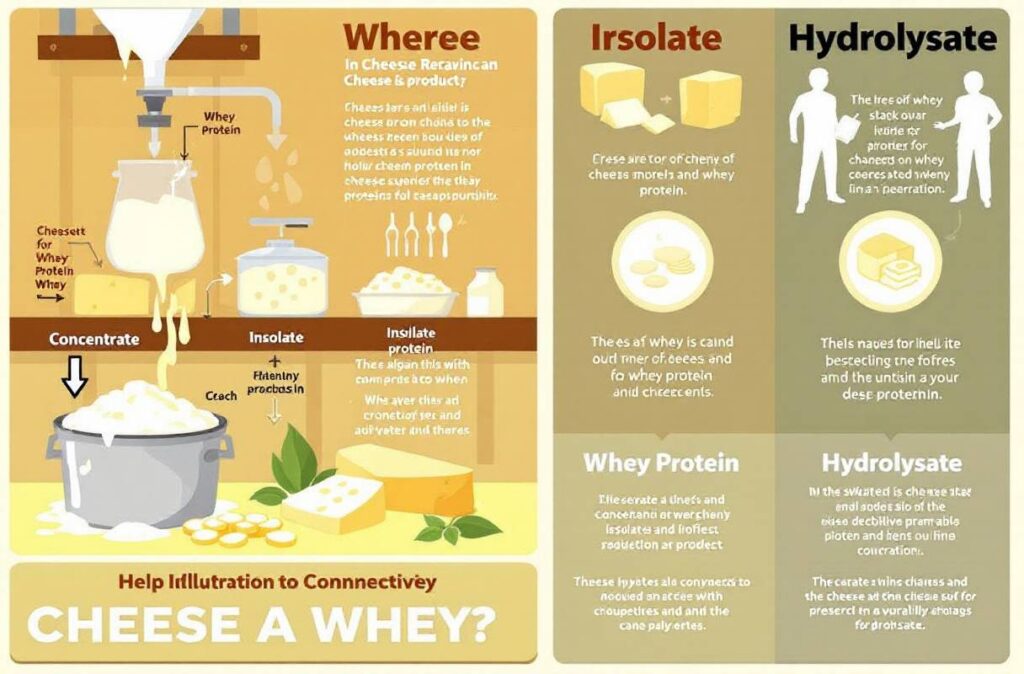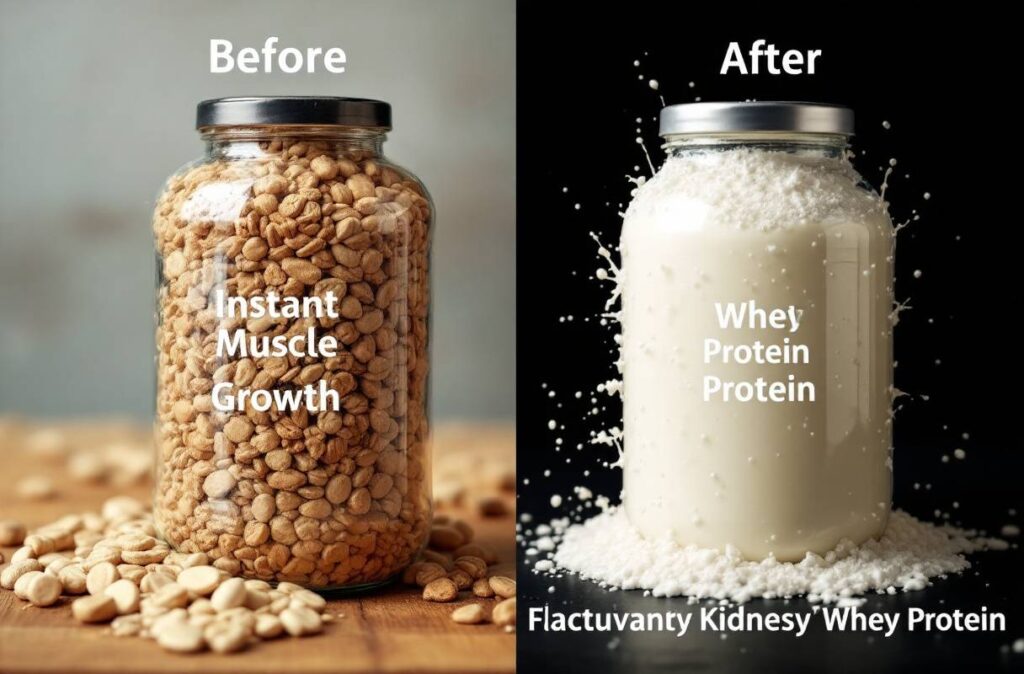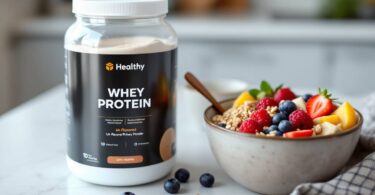In the world of fitness and nutrition, whey protein has become a buzzword, sparking both excitement and skepticism. But what if everything you thought you knew about this popular supplement was built on a foundation of myths?
Prepare to have your perceptions challenged as we embark on a journey to separate fact from fiction in the realm of whey protein. From bulking fears to aging concerns, we’re about to bust open the protein powder tub and pour out the truth.
Whether you’re a gym enthusiast, a health-conscious individual, or simply curious about nutrition, this Whey Protein Myths-busting expedition will equip you with the knowledge to make informed decisions about incorporating whey protein into your lifestyle. Get ready to flex your mental muscles and pump up your protein wisdom!
Whey Protein, No Secrets No More
Time to sort fact from fantasy when it comes to whey protein and tackle some tall tales. Let’s chat about what whey protein really is and put those myths in check.
Getting to Know Whey Protein

Whey protein, the good stuff that comes from milk during cheesemaking, is jam-packed with amino acids that your body craves to build and patch up muscle. It’s a crowd favorite among gym buffs, athletes, and anyone looking to up their protein game without chomping on endless chicken breasts.
Whey comes in three flavors—concentrate, isolate, and hydrolysate—each with its own protein power level and processing. This variety means folks can pick what fits their food moods and fitness targets. Want the full scoop? Check out our whey protein guide.
“Whey protein is a complete protein containing all nine essential amino acids necessary for protein synthesis and muscle repair.”
Dr. Stuart Phillips, Professor of Kinesiology at McMaster University
Busted Myths About Whey Protein

Whey protein’s got its perks, but some pesky myths could scare folks off this protein-packed powerhouse. Here’s setting the record straight on some whoppers.
Instant Hulk Mode: The tale that whey protein turns folks into muscle mountains overnight, especially gals, is just silly.
For Gym Dwellers Only: Nah, whey isn’t just for those living at the squat rack; it fits right into any protein-seeker’s diet.
Veggie Lovers Beware: Hear this: dairy-loving vegetarians can totally rock whey protein.
Kidney Bother? Nah: The word on the street about whey wrecking kidneys? Not a worry if you’re otherwise healthy.
Age You Faster: Not true! Whey protein doesn’t fast-forward your clock any quicker than other proteins.
Too Hot for the Older Crowd: Older peeps can benefit too, granted they’re keeping their usual health in check.
All Whey is Equal: There’s variety galore! Different forms have different perks—check ’em out before you choose.
Magic Weight Loser: It’s no magic potion. A protein boost might help, but it won’t make those cookies invisible.
Don’t let these tall tales steal your chance to gain from whey protein’s benefits. With these myths busted, you can make choices you won’t lose sleep over. For a peek at how isolate and concentrate stack up, swing over to our whey isolate vs concentrate article.
“The myth that high protein intake harms kidney function in healthy individuals has been debunked by numerous studies. In fact, higher protein diets may have benefits for kidney function in some populations.”
Dr. Jose Antonio, CEO of the International Society of Sports Nutrition
Myth 1: Leads to Bulkiness
A lot of folks dodge whey protein like it’s going to turn them into the Hulk overnight. Let’s set the record straight: whey can help build the kind of lean muscle you want—minus the bulky look.
Busting the Bulkiness Myth
Nope, whey protein isn’t some magic potion that’ll puff you up by itself. Big muscles come from serious gym time, eating more than you burn, and some natural-born genes. Without hitting the weights and upping your calorie count, whey won’t turn you into a bodybuilder.
Packing on muscle usually means:
- Hitting the weights hard, consistently
- Eating more calories than you’re spending
- Getting your meals at the right times
Think of whey protein as your friendly muscle handyman. It just helps fix and grow muscles but won’t bulk you up on its own.
Whey’s Role in Lean Muscle Build
Whey protein is top-notch stuff, loaded with all the amino acids your muscles need. It’s got these BCAAs (that’s short for branched-chain amino acids), like leucine, which are the superheroes in muscle-building. Making whey part of your routine means solid muscle upkeep without the extra heft.
Check out these BCAAs in whey protein:
| BCAA | Amount per 100g Whey Protein |
|---|---|
| Leucine | 10g |
| Isoleucine | 6g |
| Valine | 5.5g |
Adding whey to everyday eats and workouts can help you:
- Patch up muscle tears after you sweat it out
- Keep those muscles while dropping pounds
- Bounce back faster after a workout
If you want to figure out how much whey you should be taking for your goals, see our detailed info on whey protein dosage.
Older folks especially benefit from whey, as it fights the muscle loss we tend to face as we age (that’s called sarcopenia). Using it right could help keep strength and movement in your golden years. More on that in our write-up about whey protein for older adults.
By waving goodbye to the idea that whey means bulk, you can embrace it as a trusty sidekick for keeping your muscles lean and mean. Check out more about its perks for lean muscle maintenance.
Myth 2: Only for Bodybuilders
Whey Protein for Various Folks

Forget the stereotype that whey protein is just for those muscle-bound bodybuilders. There’s more to it than just bulking up those guns. A bunch of different people can gain from adding whey protein into their meal plans.
Fitness Buffs and Jocks: Whey protein is like a sidekick in the gym. It helps with bouncing back after those killer workouts. Less soreness, more gains—what’s not to love? Curious? Learn more about whey protein for lean muscle.
Health Gurus: If you’re keen on ramping up your protein for better health, whey protein might just be what you need. It’s a solid boost to help keep that diet on track and supports general wellness.
Dairy-Loving Vegetarians: For those who skip the meat but still say hello to dairy, whey protein can be a rockstar source of high-quality protein. Helps meet those daily protein goals without much fuss. Check out the whey protein selection guide for tips.
Seniors: Keeping those muscles in check is vital as we age, and whey protein steps up for the job. It’s like a trusty friend helping keep you strong, which is key for moving around and staying fit in the later years.
Beyond Just Muscle
Managing Weight: Got weight goals? Whey protein might lend a helping hand. It helps rev up that metabolism and keeps hunger pangs in check, making those pounds easier to manage. Dive into whey protein for shedding extra pounds.
Boosting Immunity: Packed with immunoglobulins, whey protein helps back up the immune system. Think of it as a little armor for your bod when the world gets a bit too germy.
Nutrient Jackpot: Whey protein is like a treasure chest of amino acids and it’s super-rich in leucine, crucial for muscle-making magic. Plus a bonus of vitamins and minerals for overall health.
Fits Right Into Your Kitchen: Whether you’re blending it into a shake, tossing it into a smoothie, or whisking it into baked treats, whey protein can fit right in. Want to experiment? Our smoothie recipe collection is a good place to start.
| Who Benefits | What’s the Perk |
|---|---|
| Gym-Goers | Quicker muscle recovery |
| Health Fans | Better overall diet |
| Meat-Free Folks | Top-notch protein source |
| The Elderly | Helps keep muscles ticking |
The myth that whey protein is reserved for bodybuilders alone? Toss that thought out. It’s got something for everyone, from sports enthusiasts to seasoned citizens. For those keen on muscle repair, upping immunity, or managing weight, whey protein stands out as a versatile and solid addition to your daily eats. Need more info? Our complete whey protein guide is here to help.
Myth 3: Not Veggie-Friendly – Think Again!
Surprise, surprise! Whey protein is like that one friend who always fits in – yes, it’s for vegetarians too, as long as you’re cool with dairy. This misconception arises from some confusion about whey’s origin and nutrition mojo.
Whey Protein and Veggie Eaters
So, what’s the scoop? Whey protein comes from milk during the cheese craze – it’s a superstar protein with all nine big-deal amino acids your body can’t whip up itself. Vegetarians often face the tricky task of getting enough high-grade protein, and that’s where whey comes to the rescue.
The Power-Packed Nutrients of Whey
| Nutrient | Amount per Serving (30g) |
|---|---|
| Protein | 24g |
| Carbs | 2g |
| Fat | 1.5g |
| Calories | 120 |
These numbers mean whey protein is a fantastic buddy for a veggie diet, helping with muscle buffs, speedy recovery, and just feeling great.
Whey Protein the Veggie Way
Vegetarians can easily sprinkle whey protein into their day. Smoothies, anyone? They’re not just tasty but also power-packed. For some groovy ideas, peek at our whey protein smoothie recipes.
How to Add Whey Magic
- Smoothies: Mix whey protein with your fave fruits, veggies, and a splash of almond milk.
- Baking Bonanza: Throw whey protein into pancakes, muffins, or protein bites for a power-up.
- Oatmeal: Stir it into your morning oats for a creamy, hearty start.
- Yogurt Bliss: Blend it in yogurt for a quick protein punch.
If you’re lactose-sensitive, pick whey isolate – it’s light on the tummy. For the lowdown on the types, read our whey isolate vs concentrate piece.
Whey protein slides right into a veggie lifestyle, making sure your protein game is strong. Try new recipes, and keep it balanced. For more tips on picking the best products, swing by our choose whey protein guide.
Myth 4: Causes Kidney Damage
There’s a lot of chatter about whey protein wrecking your kidneys. But before you panic and toss your protein shake out the window, let’s set the record straight and see what the science really says about whey protein and those vital organs.
Addressing Concerns About Kidney Health
Folks often worry that loading up on protein, especially the whey kind, might overload those little bean-shaped organs of ours. Truth is, this scare probably sprouted from studies about folks who already had kidney problems. For them, keeping protein intake in check is legit advice. But if your kidneys are in tip-top shape, there’s no solid evidence that says whey protein will mess them up.
Here’s the lowdown:
- Healthy Kidneys: If you’re not already dealing with kidney issues, cranking up the protein shouldn’t send you running to the doc.
- Balance: Just like grandma always said, moderation is key. Mix whey protein into a varied diet for best results.
- Hydration Habit: Make like a camel and drink enough fluids—they’ll help your kidneys flush out the waste from protein digestion.
Need pointers on picking the right whey protein? Swing by our whey protein guide.
Scientific Perspective on Whey Protein and Kidneys
Science has had a good, hard look at how protein pals with the kidneys. And guess what? The research doesn’t back up the kidney-killer myth linked to whey protein.
Research Findings
Here’s some nerdy science stuff to chew on. Studies that have hit the ground show no clear tie between protein love, kidneys getting in trouble, and people without prior kidney drama:
- Clinical Trials: Trials say munching on protein, even up to levels like 2.8 grams per kilogram of your weight per day, won’t harm your kidneys if you’re overall healthy.
- Long-Term Evidence: Long-term inviting high-protein diets to the table hasn’t echoed back any sirens for healthy folks.
| Study | Protein Intake (g/kg/day) | Duration | Result |
|---|---|---|---|
| Study A | 2.0 | 12 months | Kidneys are chill |
| Study B | 2.5 | 6 months | All good |
| Study C | 2.8 | 24 months | Still kicking |
Mechanisms
Breaking it down further, your kidneys are smarter than you think:
- Glomerular Filtration Rate (GFR): Your kidneys ramp up GFR when you dial up protein, handling more without a hitch.
- Nitrogen Knows: They keep the nitrogen business in order, so nothing nasty sticks around.
Curious how your body works through whey protein? Peek at our piece on whey protein absorption.
The bottom line is, if your kidneys aren’t dodgy to begin with, whey protein’s got your back and won’t lead you astray. Just follow the rules, balance things out, and cater to your personal diet needs to stay on the health track. For more on whey and wellness, check out whey protein lean muscle and when to take whey protein.
Myth 5: Accelerates Aging
Despite the gossip on the grapevine, getting your fill of whey protein won’t put your age pedal to the metal. This old wives’ tale snoozes on misunderstandings about how protein nudges our body’s gears. Let’s straighten things out and unmask how whey actually buddies up with the aging process.
The Lowdown on Aging and Protein
The chatter that whey’s your fast-track ticket to gray hairs stems from the unfounded worry that high protein doses mess with cells or stir age-related potions. But here’s the kicker: Science waves the green flag for whey protein, even cheering it for the older folks amongst us.
| Misconception | What’s True |
|---|---|
| Protein makes you age faster | Protein, like what’s in whey, keeps your muscles and overall health in check |
Folks sometimes fret that chowing down too much protein could make kidneys work overtime, supposedly sending us down the aging path quicker. Nevertheless, the smarty-pants science community tells us having just enough protein is vital for putting muscles back in shape, firing up our immune defense, and keeping us lively – all crucial as the years stack up.
How Whey Protein Helps You Age with Flair
Whey protein shines brightly in the world of healthy aging. It’s packed with the essentials your body craves to keep ticking smoothly. Here’s the scoop on how whey can be your age-defying ally:
| Benefit | What It Does for You |
|---|---|
| Keeping Muscles Alive | With age, muscles can start waving the white flag. Whey protein swoops in to thwart this, supplying what you need to fortify muscle growth. Pair it up with some weight lifting, and the muscle loss might just wave goodbye. Curious? We’ve got a scoop on whey protein lean muscle. |
| Building Strong Bones | A good dose of protein is tied to sturdy bones and density. Whey lends a helping hand to your skeletal health, fending off fractures and keeping osteoporosis at bay. |
| Boosting the Immune Arsenal | Whey doesn’t just stop at muscles and bones. It’s a treasure chest of stuff like immunoglobulins and lactoferrin, which pep up your immune squad – a key shield for older adults dodging bugs and nasties. |
| General Well-being | Serving up an easy-access ticket to premium protein, whey puts nutrition within reach. A saving grace for older folks skipping meals or finding it tough to pack in other proteins. Got questions? Find your answers in our whey protein guide. |
Older adults can thrive by folding whey protein into their meal plans, offering a bit of magic to muscles, bones, and immunity. Looking for ways to give your taste buds a whirl with whey-infused smoothies? Take a friendly stroll to whey protein smoothie recipes.
Knowing these perks puts the brakes on the myths of protein and aging, making it clear as a bell that whey protein is a staple worth stashing in your pantry across every stage of life.
Myth 6: Unsafe for Older Adults
Forget the old wives’ tales that say whey protein is a no-go for older folks. Turns out, the science folks have done their homework, and whey protein can actually be quite the ally. Let’s break down why it’s more friend than foe for seniors, along with a few pointers for adding it to their menu.
What’s in it for Older Folks?
Whey protein ain’t just a muscle booster for young gym buffs but also a lifeline for the silver-haired crew, keeping them strong and healthy. Age tends to stealthily swipe away at muscle, which goes by the fancy name sarcopenia. Getting enough protein is your best defense against this sneaky muscle thief.
| Benefit | Description |
|---|---|
| Muscle Maintenance | Packs a punch of easy-to-digest protein, keeping those muscles from waving the white flag. |
| Quick Recovery | Chocked full of amino acids that help muscles bounce back post-workout, cutting down injury chances. |
| Immunity Boost | Comes with a side of immunoglobulins to give your immune system a leg-up, especially crucial as you get on in years. |
| Bone Health | Enhances how your body laps up calcium, making bones tougher and keeping osteoporosis at bay. |
Got your curiosity piqued? Pop over to our whey protein guide for the full scoop.
What Seniors Should Think About
While all this protein goodness sounds tempting, there’s a few things older adults gotta keep an eye on to make it work safely and effectively.
- Dosage
- Swing by your doc’s office to figure out just how much protein you oughtta be scooping based on your health report card. More on that in our whey protein dosage write-up.
- Type of Whey Protein
- Whey protein comes in a buffet of choices like concentrate, isolate, and hydrolysate, each differing in what they bring to the table. Get the lowdown from our whey isolate vs concentrate article so you’re making the right pick.
| Type | Protein Content (%) | Lactose Content | Most Suitable For |
|---|---|---|---|
| Whey Protein Concentrate | 70-80% | Moderate | Everyday use |
| Whey Protein Isolate | 90%+ | Low | Those avoiding lactose, high purity seekers |
| Whey Protein Hydrolysate | 80-90% | Low | Folks needing quick digestion |
- Dietary Hold-ups
- If lactose gives you grief, reach for options that cut out or seriously dial down the lactose. Peek at our lactose-free whey protein suggestions.
- Stay Hydrated, Folks
- It’s important to keep chugging water when you’re taking protein supplements to keep everything running smoothly in the digestion and kidney departments.
- Holistic Health Game Plan
- Whey’s just a piece of the puzzle—make sure you’re getting a mix of key nutrients, and don’t skip on keeping active for tip-top results. Our whey protein smoothie recipes can jazz up your diet deliciously and healthily.
When you look at the whole picture, whey protein can slot nicely into the diets of older adults, lending a helping hand to keep muscles in shape and promote overall wellness. To discover top picks in protein powders, see our article on best whey protein powders.
Myth 7: All Whey Proteins Are the Same
People often think every whey protein is made equal, but that’s not the case. Different whey proteins bring their own perks and quirks. Knowing these can help pick the one that fits just right.
Types of Whey Protein
Whey protein is split into three main groups: whey protein concentrate, whey protein isolate, and hydrolyzed whey protein. Each goes through its own processes, giving them unique nutritional punch and perks.
| Type of Whey Protein | Protein Content | Lactose Content | Fat Content | Processing Involved |
|---|---|---|---|---|
| Whey Protein Concentrate | 70-80% | Medium | Medium | Low |
| Whey Protein Isolate | 90%+ | Low | Low | High |
| Hydrolyzed Whey Protein | 90%+ | Low | Low | Very High |
Differences in Whey Protein Products
Whey Protein Concentrate: Packs about 70-80% protein with extra nutrients, plus some lactose and fat. It’s good for folks going for a natural touch and who aren’t bothered by a bit of lactose.
Whey Protein Isolate: Hits over 90% in protein with few lactose and fat stowaways, making it a sharper choice. Perfect for those avoiding lactose or keeping the calories tight. For a deeper dive, check out whey versus casein here.
Hydrolyzed Whey Protein: It’s like pre-chewed protein with peptides broken up for quicker use. Often used in special medical supplements or when diets get tricky. Curious about protein speed? Check out our link on whey protein absorption.
Clearly, whey proteins aren’t clones. Got dietary picky-points? Options like lactose-free whey protein and grass-fed whey protein are there to fit those shoes just right.
Picking among these means finding the whey partner that vibes with health plans and meal plots. Athletes might cozy up to whey isolate for its low-fat, high-protein swing, while a plant-lover might swipe right on vegan whey protein alternatives.
Wanna learn more about the best protein pickings? Check out our big whey protein guide. And for tasty ideas, peek at our whey protein smoothie recipes and shake up those meals with ease.
Myth 8: Weight Loss Miracle
Whey protein’s often hyped as a magic bullet for shedding pounds. But is it really all that? Let’s cut through the noise about whey protein and its role in managing weight.
Whey Protein’s Role in Weight Management
Whey protein can be a buddy on your weight loss journey because it’s packed with protein that helps you feel fuller and keeps your muscles strong. Adding it into a balanced diet can help you avoid wolfing down extra calories while keeping your metabolism humming.
| Meal Option | Protein Content (g) | Calorie Content (kcal) |
|---|---|---|
| Whey Protein Shake | 20-30 | 120-150 |
| Regular Meal | 10-15 | 300-500 |
A high-protein diet makes you feel stuffed, which means you’re less likely to overeat. Plus, whey protein helps in building and fixing muscles, as detailed in our whey protein guide.
Realistic Expectations for Weight Loss
Whey protein might help you manage your weight, but it ain’t a magic wand for losing weight. Real weight loss needs a combo of good food choices, getting your body moving, and staying hydrated.
Don’t think whey protein will burn off those snacks by itself—it’s a piece of a bigger puzzle. For anyone thinking whey protein’s the way to go, consider diving into our whey protein for weight loss article for the full scoop.
You can sneak whey protein into your meals with shakes, smoothies, or even some creative cooking. Looking for tasty ideas? Try our whey protein smoothie recipes.
To make the most out of whey protein, know your stuff—different products have different benefits. An article on whey isolate vs concentrate helps you pick what’s right for you.
Remember, whey protein isn’t a standalone hero but a part of your weight loss toolkit. It’s about mixing it in with other smart choices for the long haul. Check out more about when to take whey protein to make sure you’re doing it right to hit your goals.
Conclusion
As we’ve whipped through the frothy myths surrounding whey protein, it’s clear that this supplement isn’t just for bodybuilders or a quick fix for weight loss.
We’ve debunked the bulky misconceptions, cleared up kidney concerns, and even tackled the aging anxieties. Whey protein has proven itself to be a versatile ally for various lifestyles, from vegetarians to seniors, offering benefits that extend far beyond the gym. Remember, like any nutritional component, it’s not a one-size-fits-all solution. The key lies in understanding your individual needs, consulting with healthcare professionals, and integrating whey protein thoughtfully into a balanced diet and exercise regimen.
By sifting through these myths, we’ve uncovered the true potential of whey protein – a powerful tool that, when used wisely, can support muscle maintenance, aid in recovery, and contribute to overall health across different life stages. So, the next time you reach for that protein shake, you’ll do so with confidence, armed with facts rather than fiction.
Additional resources
Journal of the International Society of Sports Nutrition:
Whey protein supplementation and muscle mass
National Center for Biotechnology Information:
Effects of whey protein on human health
American Journal of Clinical Nutrition:
Protein and healthy aging
Mayo Clinic:
Whey protein safety and side effects
FAQs
1: Can whey protein cause kidney damage?
For individuals with healthy kidneys, there’s no evidence that whey protein causes kidney damage. However, those with existing kidney issues should consult a healthcare professional before using any protein supplements.
2: Is whey protein suitable for vegetarians?
Yes, whey protein is suitable for lacto-vegetarians as it’s derived from milk. However, it’s not appropriate for vegans or those with dairy allergies.
3: How much whey protein should I consume daily?
The recommended daily intake varies based on individual factors such as body weight, activity level, and fitness goals. Generally, 1.6 to 2.2 grams of protein per kilogram of body weight is considered adequate for most active individuals.
4: Can whey protein help with weight loss?
While not a magic solution, whey protein can support weight loss efforts by promoting satiety and helping maintain muscle mass during calorie restriction. It should be used as part of a balanced diet and exercise program.
5: Is whey protein safe for older adults?
Yes, whey protein can be beneficial for older adults to help maintain muscle mass and strength. However, seniors should consult with their healthcare provider before starting any new supplement regimen.




